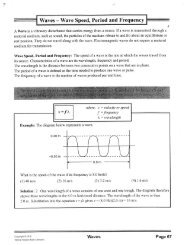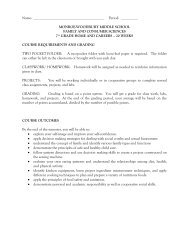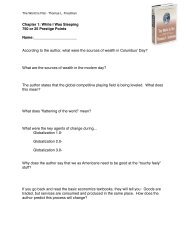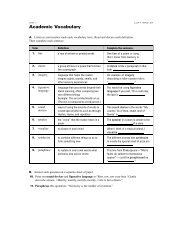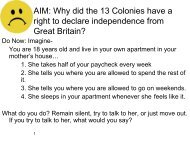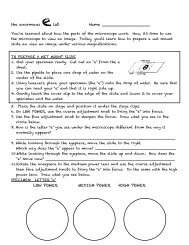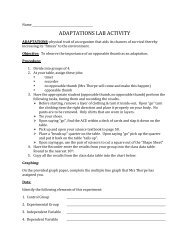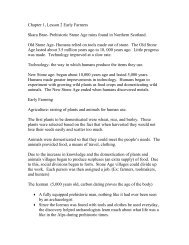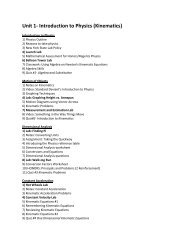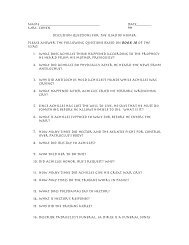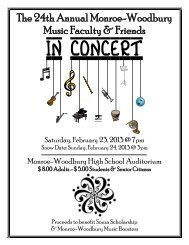Enlightenment
Enlightenment
Enlightenment
Create successful ePaper yourself
Turn your PDF publications into a flip-book with our unique Google optimized e-Paper software.
<strong>Enlightenment</strong><br />
1.”Age of Reason” –Reason or logic was used<br />
to Improve society.<br />
2. Natural laws (Universal laws that are always<br />
true) were used to improve society<br />
3. Governments received their authority(power)<br />
from the people –Not from God. They believed<br />
in democracy.<br />
4. Scientific Rev and <strong>Enlightenment</strong><br />
encouraged spread of new ideas and use of<br />
reason.<br />
1
<strong>Enlightenment</strong> Thinkers<br />
1. Thomas Hobbes<br />
2. John Locke<br />
3. Baron de Montesquieu<br />
4. Jean-Jacques Rousseau<br />
5. Voltaire<br />
2
Leviathan<br />
A Leviathan is a huge<br />
“sea monster”<br />
represents the all<br />
powerful government<br />
Hobbes believed exist to<br />
avoid chaos<br />
3
Thomas Hobbes<br />
• English Philosopher<br />
• Published the Leviathan<br />
• In the beginning, people lived in anarchy<br />
• Life is violent and dangerous<br />
• People choose a leader to rule them and protect<br />
them<br />
• People give Monarch absolute power<br />
• A social contract creates stability<br />
• People only have the right to protect themselves<br />
4
Who wrote the Two Treatises of Government?<br />
The mystery<br />
author!<br />
5
John Locke<br />
• English Philosopher<br />
• Published Two Treatises of Government<br />
• People have made a social contract<br />
• But have kept:<br />
• The right to life, liberty and property<br />
• Rulers must preserve these rights<br />
• If not, people have the right to overthrow<br />
such ruler and replace him for breaking<br />
the social contract<br />
6
French agreed with his ideas…The people<br />
should rebel!<br />
The Storming of Bastille<br />
Liberty leading the<br />
People<br />
by Delacroix<br />
7
Locke vs. Hobbes<br />
•What was the<br />
differences in their<br />
ideas about Social<br />
Contracts?<br />
8
Baron de Montesquieu<br />
• Promoted the idea of a government with<br />
separation of powers.<br />
• Wrote a book The Spirit of the Laws,<br />
• Executive Branch: to enforce the laws<br />
• Legislative Branch: to make the laws<br />
• Judicial Branch: to interpret the laws, or<br />
make sure they are fair. (Supreme Court)<br />
• Thought that individual rights should be<br />
protected.<br />
9
Rousseau<br />
• French Author and thinker. Published The Social<br />
Contract- everyone works for common good of<br />
society<br />
• Believed that the (Popular Sovereignty) power<br />
to rule belonged to the people, and governments<br />
should receive their authority from the people.<br />
• Believed that people had the right to rise up<br />
against their government and carry out needed<br />
changes.<br />
• "Man is born free and everywhere he is in<br />
chains."<br />
10
Francis-Marie Arouet (1694-1778)<br />
(Voltaire)<br />
• Wrote Candide in 1759 in which he<br />
analyzes the problem of evil in the world<br />
and depicts the woes heaped upon the<br />
world in the name of religion<br />
• His battle cry against the Roman<br />
Catholic Church was ecrasez l’infame<br />
(“crush the damned thing”) Believed in<br />
religious freedom and freedom of<br />
speech.<br />
• "I disapprove of what you say but I<br />
will defend to the death your right<br />
to say it."<br />
• "It is dangerous to be right when the<br />
government is wrong.<br />
• French Author and thinker.<br />
• "Man is free at the moment he wishes to<br />
be”<br />
11
There should be “separation<br />
of church and state”<br />
This was Voltaire's belief<br />
Church State 12
<strong>Enlightenment</strong> Philosophers<br />
Thinker Main Ideas Type of Government<br />
Hobbes •Wrote the Leviathan (1651)<br />
•convinced that all humans were naturally selfish and wicked<br />
•Social Contract<br />
Absolute Monarchy<br />
Locke<br />
Voltaire<br />
Montesquieu<br />
Rousseau<br />
Beccaria<br />
•Humans are reasonable and could learn from mistakes<br />
•All people are born free and equal-life, liberty, & pursuit of happiness<br />
•Government comes from consent of people<br />
•Thought to be the most brilliant of the philosophes<br />
•Believed in freedom of speech-used literature as his weapon<br />
•Separation of powers (checks and balances)<br />
•United States used his ideas as basis for government<br />
•Believed that civilization corrupted people’s natural goodness<br />
•Believed that man was born free but governments hinder peoples<br />
freedom<br />
•Laws exist to preserve order not to avenge crimes<br />
•Ideas became basis of US Bill of Rights-outlawed torture, speedy<br />
trials, etc.<br />
Self-Government<br />
(Democracy)<br />
Democracy<br />
Democracy<br />
Direct Democracy<br />
Democracy<br />
(Greatest good for the<br />
greatest number of<br />
people)<br />
Wollstonecraft •Argued for women’s rights Democracy (Equal<br />
Rights)
Copy these quotes into your notebook and draw a small image next to each to<br />
illustrate it!<br />
All mankind... being all equal and<br />
independent, no one ought to harm<br />
another in his life, health, liberty or<br />
possessions. – John Locke<br />
Without governments, there would be<br />
“war….of every man against every man”-<br />
Thomas Hobbes<br />
I do not agree with a word you say but<br />
will defend to the death your right to say<br />
it- Voltaire<br />
Power should be a check to power-<br />
Montesquieu<br />
Man is born free, and everywhere he is in<br />
chains- Rousseau
Key effects(results) 0f the<br />
<strong>Enlightenment</strong><br />
• 1. Believed could overthrow unfair<br />
governments-led to revolutions in<br />
U.S., France and Latin America.<br />
• 2. Enlightened Despots –European<br />
monarchs who ruled using<br />
<strong>Enlightenment</strong> principles (ideas)<br />
15
Salons Spread <strong>Enlightenment</strong> ideas :Mme. Geoffrin entertains.<br />
16
<strong>Enlightenment</strong> Ideas affect the<br />
culture<br />
Desire for geometric shapes, orderly<br />
repetition in mathematical patterns<br />
Dislike for “messiness” and “Chaos”<br />
Preference for Democracy<br />
Preference for civilized, polite<br />
discussion of ideas. Intellectual<br />
debate not force.<br />
Desire to create social standards<br />
based on reason not tradition.<br />
17
Gardens -Straight lines, 90 degree corners, the stuff to<br />
warm the heart of an <strong>Enlightenment</strong> thinker. Thus,<br />
hedge--mazes appear across Europe.<br />
18
Even the untidiness of natural hair disturbs <strong>Enlightenment</strong> society. Thus, the tradition of the<br />
perfectly coiffed wig appears in the age of Washington and Jefferson and Marie Antoinette.<br />
Powdered porcelain make-up and other cosmetics become fashionable and artificial<br />
“beauty” patches (bits of black cloth with adhesive) are used to create artificial moles or<br />
freckles (or to hide natural ones.) It is an age of artifice.<br />
19
Architecture-studied<br />
the ideas and art of<br />
ancient Greece and<br />
Rome.”Neoclassical”<br />
20
Whose house is this and what architecture<br />
inspired it?<br />
21
ART-Rococo Style-Painting<br />
Softer, more delicate style than<br />
baroque shell-like decoration<br />
used in gardens.<br />
Art as happy, witty, frivolous,<br />
playful<br />
22
What famous <strong>Enlightenment</strong><br />
painting is this?<br />
23
Liberty Leading the<br />
People<br />
Lady Liberty<br />
24
Changes In music and<br />
Literature<br />
• Lighter and more<br />
elegant sound.<br />
• 3 Great composers<br />
were from Vienna<br />
• Franz Haydn<br />
• Wolfgang Mozart<br />
• Beethoven<br />
• Literature –novels<br />
• Growing Middle class<br />
made novels and<br />
fiction popular<br />
• Dictionary-Samuel<br />
Johnson 1755<br />
25
Jonathan Swift<br />
A Modest Proposal recommended<br />
that poor Irish children be butchered,<br />
roasted and served for Sunday<br />
dinners. It would reduce population<br />
and provide income.<br />
Gulliver’s Travels Horses put humans<br />
to shame. Mocked humans as Yahoos<br />
26




